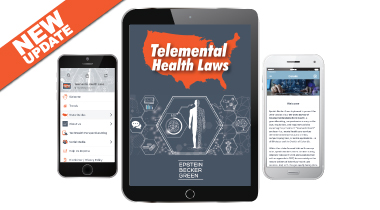Health care providers are grappling with how to deal with the various implications of the novel coronavirus (“COVID-19”) on their professional practices. While providers struggle to provide care to their patients amid COVID-19 contagion concerns, recent regulatory efforts at both the federal and state level will help ease the path to the provision of services via telehealth.
Federal
- On March 13, 2020, President Trump issued a Proclamation on Declaring a National Emergency Concerning the Novel Coronavirus Disease (COVID-19) Outbreak. In this proclamation, among other things, President Trump stated that the Secretary of Health and Human Services (“HHS”) may exercise his authority under Section 1135 of the Social Security Act to temporarily waive or modify certain requirements of the Medicare, Medicaid, and State Children’s Health Insurance Programs (“CHIPs”) and of the Health Insurance Portability and Accountability Act (“HIPAA”) Privacy Rule throughout the duration of the public health emergency declared in response to the COVID‑19 outbreak.
- Section 1135 of the Social Security Act gives the Secretary of HHS authority to waive certain requirements during national emergencies. Per Section (b)(2), the Secretary may “temporarily waive or modify the application of, with respect to health care items and services furnished by a health care provider (or classes of health care providers) in any emergency area . . . during any portion of an emergency period, the requirements of titles XVIII, XIX, or XXI, or any regulation thereunder (and the requirements of this title other than this section, and regulations thereunder, insofar as they relate to such titles), pertaining to . . . requirements that physicians and other health care professionals be licensed in the State in which they provide such services, if they have equivalent licensing in another State and are not affirmatively excluded from practice in that State or in any State a part of which is included in the emergency area. . . .” Section 1135 waivers are discussed more generally on the Centers for Medicare & Medicaid Services (“CMS”) website, with a succinct overview of what is typically permitted under these types of waivers and how states may request them. These waivers apply to the government health care programs.
- Secretary Alex Azar used his authority under the Public Health Service Act to declare a public health emergency for the entire United States on January 31, 2020 (effective on January 27). Following President Trump’s declaration of a national emergency, Secretary Azar issued a more detailed statement that specifically mentioned the actions he would be taking pursuant to Section 1135, including the waiver or modification of “[r]equirements that physicians or other health care professionals hold licenses in the State in which they provide services, if they have an equivalent license from another State (and are not affirmatively barred from practice in that State or any State a part of which is included in the emergency area).” These waivers apply to the government health care programs.
- In a summary published on March 15, 2019, CMS clarified the scope of Section 1135 waivers: “In addition to the statutory limitations that apply to 1135-based licensure waivers, an 1135 waiver, when granted by CMS, does not have the effect of waiving State or local licensure requirements or any requirement specified by the State or a local government as a condition for waiving its licensure requirements. Those requirements would continue to apply unless waived by the State. Therefore, for all practical purposes, in order for the physician or non-physician practitioner to avail him- or herself of the 1135 waiver under the conditions described above, the State also would have to waive its licensure requirements, either individually or categorically, for the type of practice for which the physician or non-physician practitioner is licensed in his or her home State” (emphasis added).
- Under the new Section 1135 waiver applicable to telehealth services, Medicare can pay for office, hospital, and other visits furnished via telehealth across the country and including in patient’s places of residence starting March 6, 2020. A range of providers, such as doctors, nurse practitioners, clinical psychologists, and licensed clinical social workers, will be able to offer telehealth services to their patients. Additionally, the HHS Office of Inspector General is providing flexibility for health care providers to reduce or waive cost sharing for telehealth visits paid by federal health care programs. Please see the CMS Fact Sheet on Medicare’s expanded coverage of telehealth services for more information.
- CMS also has released COVID-19 checklists and tools to accelerate relief for state Medicaid and CHIP programs. Specifically, CMS has created four tools that will permit states to access emergency administrative relief, make temporary modifications to Medicaid eligibility and benefit requirements, relax rules to ensure that individuals with disabilities and the elderly can be effectively served in their homes, and modify payment rules to support health care providers impacted by the outbreak. President Trump has also called on states to allow Medicaid beneficiaries to receive services through telehealth. While this does not require federal approval in many cases, these tools can also help states quickly remove state-specific restrictions on telehealth. For more information on these tools, please see the CMS webpage that discusses the 1115 Waiver Opportunity and Application Checklist, the 1135 Waiver Checklist, the 1915(c) Appendix K Template, and the Medicaid Disaster State Plan Amendment Template in greater detail.
- CMS has a tremendous resource page where these resources and many others are located. One piece of content you can access from this page is CMS Administrator Seema Verma’s remarks/response to President Trump’s declaration, in which she states “[T]his is just the beginning of our work on telehealth—we will have more flexibility coming in the coming days.”
- The Drug Enforcement Agency (“DEA”) has invoked the public health emergency exception under 42 U.S.C. 247d (Section 319 of the Public Health Service Act), as set forth in 21 U.S.C. 802(54)(D), to the federal Ryan Haight Act requirement to conduct an in-person exam before prescribing controlled substances via telemedicine. Accordingly, as of March 16, 2020, and continuing for as long as the Secretary’s designation of a public health emergency remains in effect, DEA-registered practitioners in all areas of the United States may issue prescriptions for all schedule II-V controlled substances to patients for whom they have not conducted an in-person medical evaluation, provided all of the following conditions are met:
- The prescription is issued for a legitimate medical purpose by a practitioner acting in the usual course of his/her professional practice;
- The telemedicine communication is conducted using an audio-visual, real-time, two-way interactive communication system; and
- The practitioner is acting in accordance with applicable federal and state laws.
State
- Individual states have been issuing their own emergency declarations that, in some cases, are focused in part on relaxing or otherwise modifying professional licensure requirements.
- On March 24, 2020, Secretary Azar issued a letter to state governors asking for them to take certain immediate actions in response to COVID-19, many of which would increase access to telehealth services. Specifically, Secretary Azar has asked governors to allow health care professionals licensed or certified in other states to practice in their respective states, either in person or through telehealth; relax certain statutory and regulatory standards to make it easier for health care professionals to establish the provider-patient relationship and treat patients using telehealth technologies; relax scope-of-practice requirements; allow physicians to supervise a greater number of other health professionals and to do so using remote or telephonic measures; allow for rapid certification/licensure for health professionals; waive or limit medical malpractice insurance policies; and eliminate restrictions on the settings of care where certain health professionals can see patients. This letter sends a strong message to states to take action, so additional action by states is likely forthcoming.
- Of note:
- States continue to release more information, so keep checking Epstein Becker Green’s website and this app, as well as state professional board websites, for the latest information.
- States are taking different approaches to the professional licensure issue, with some states waiving requirements while others are simply modifying requirements to make obtaining licenses faster and easier.
- States also are taking different approaches to whether these changes apply specifically to providing services related to COVID-19, or are applicable to health care services provided more generally.
- Some states, while they have released emergency declarations regarding COVID-19, have not specifically mentioned changes to their professional licensure rules and requirements (i.e., whether to waive or modify such requirements). Some states have not yet issued any guidance. It is anticipated that this will change in the days and weeks to come.
- In addition, some states have already applied for Section 1135 waivers. All Section 1135 approval letters will be posted on the CMS website as they are issued.
- Of note:
- On March 15, 2020, CMS approved the first Section 1135 waiver request for the state of Washington. Washington State’s Section 1135 waiver request sought flexibility related to telephonic and telehealth options, among other things.
- On March 16, 2020, CMS approved Florida’s Section 1135 waiver request which, among other things, sought a waiver of certain provider participation screening requirements, a waiver of some prior authorization requirements for services, and a waiver to allow evacuating facilities to provide services in alternative settings, such as a temporary shelter when a provider’s facility is inaccessible.
- On March 23, 2020, CMS approved waiver requests for Alabama, Arizona, California, Illinois, Louisiana, Mississippi, New Hampshire, New Jersey, New Mexico, North Carolina, and Virginia.
- On March 24, 2020, CMS approved waiver requests for North Dakota, Oklahoma, and South Dakota.
- On March 25, 2020, CMS approved waiver requests for Indiana, Iowa, Kansas, Kentucky, and Rhode Island.
People
- Member of the Firm


